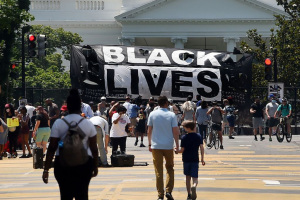Are Americans Getting Comfortable With Immorality?
While the majority of Americans believe that the country’s morality is poor and lacking, the gap between those looking for the moral high ground and those who believe we are already morally good is closing.
A Thursday Gallup poll shows the number of Americans who believe the overall state of moral values in the U.S. is poor has dropped seven percentage points to 38 percent. Meanwhile, the number of those who believe the country's morality is excellent or good has risen eight percentage points to 23 percent.
Fewer Americans also believe the country's moral values are getting worse. Sixty-nine percent, down from 76 percent in 2010, say the state of moral values is worsening, while 22 percent, up from 14 percent, believe it’s getting better.
But just by looking at the media, it’s not apparent why more Americans have a positive outlook on U.S. morality today.
"If you look at our popular entertainment, you have a situation where Americans are essentially bombarded immoral or amoral messages," said Matt Philbin, the Culture and Media Institute's managing editor and editorial director.
From movies to animated series and feel-good shows such as "Glee," Americans are constantly met with inappropriate, ungodly, unpatriotic and sexual themes, he pointed out.
If Americans continue to accept and adopt the values portrayed in pop culture (what Philbin calls "Rihanna and Lady Gaga television"), then “you'll see a decline in modesty, in probity, in a lot of things we have always valued in our culture,” he said.
Richard Land, president of Ethics & Religious Liberty Commission, shares the same concern. "The media is a detrimental influence," he remarked. "You would never know by watching American television that 61 percent of Americans say religion is very important in their lives."
For Philbin, one message in particular that the media is continuously throwing at Americans is that of affirming homosexuality and gay marriage.
A poll released by Gallup last week found that for the first time since 1996, more than half of Americans say marriage for gays and lesbians should be legal.
Philbin clarifies the data as the result of Americans being brow-beaten through various forms of media and being constantly sent a message that says "you're wrong, now change your view."
"I think frankly Americans are just tired of getting beat up over their resistance to it," he explained. "I think that at a certain point cultural fatigue sets in and you get tired of being told that you're backward, being told you're puritan troglodyte (a caveman) and a homophobe who hates people. So you shrug and say, 'yea, I'm for it' and go about your business."
Civilization, he lamented, is headed in a direction that devalues the family unit.
"If a family is just a group of people cohabitating or pooling resources, and ceases to be the very basis and building block of society, I think you're in a sort of moral quicksand where things lose meaning," Philbin cautioned.
According to the Gallup poll, Republicans make up the majority of those who hold a negative view of America's current state of morality. Moral issues that have concerned the GOP include national attacks on the Defense of Marriage Act and the nation's debt.
Land said these moral issues are rooted in the home. When morals are not instilled in children through the proper influence of a wedded father and mother, the consequences become evident in society.
"You can't separate economic issues from moral issues," said Land.
Still, fewer Independents and Democrats believe the country is in a moral decline.
Land said of these two groups, "If they're not concerned with the morals of America, then they’re part of the problem, not part of the solution."
The Southern Baptist is concerned that America has become "a nation of liars" full of people who fail to fulfill their obligation to their marriages as spouses or parents in order to satisfy their own selfish desires.
That dishonest streak, said Land, is becoming more evident in the nation's financial practices.
"The reason Wall Street failed is because of dishonest people," noted Land. "There's no system that can [succeed if it] doesn't have the basis of honesty and honor."
While the state of moral values appears to be disintegrating, Philbin believes the U.S. moral fabric is not yet in a total moral decline. Where is the evidence?
"People are still marrying, they’re still having children, they’re still concerned about what their children see," he commented.
Land’s outlook on the state of morality in the U.S. was less optimistic.
"We're seriously broken and it's getting worse and we're reaching a crisis point where we're either going to have to restore traditional American values ... or we going to see our society denigrate."



























